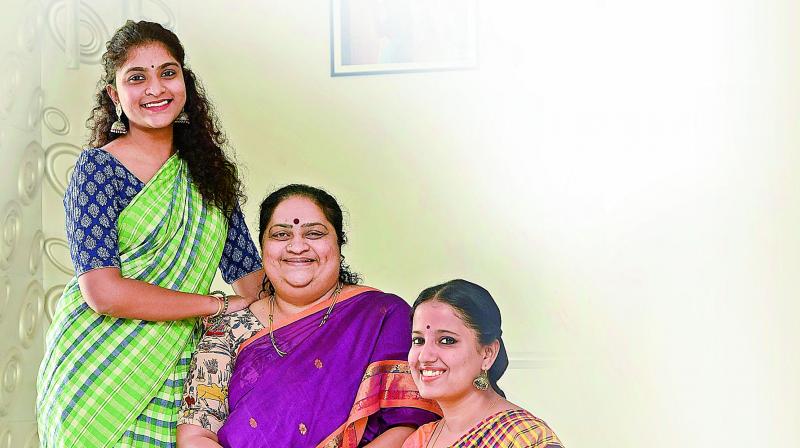The glory and grace of Kuchipudi
There is a need for dance appreciation programmes at all levels of education Aruna Bhikshu.

As Mahati Bhikshu and Lalitha Sindhuri prepare to perform a duet of a traditional Shabdam on Goddess Durga, encompassing the dramaturgy of Kuchipudi dance and choreographed by Aruna Bhikshu, the three of them share their views on the classical dance form.
Says Aruna, “I recently conducted a Kuchipudi dance workshop in Toronto and was happy to find Bengali and Tamil speaking students from India, showing keen interest apart from Sri Lankans. Kuchipudi is thus, a global art form.”
She adds, “The last Golconda ruler, Abul Hasan Tana Shah was so impressed by a Kuchipudi performance that he gave away the ‘Kuchipudi village’ to the practitioners of the form. This shows that since time immemorial, the Golconda rulers had compassion and interest in the dance form. Interestingly, Persian and Urdu languages also find their way into some of the presentations of this dance, showing a mutual exchange of cultures and patronage of the rulers beyond religion. Right now, there is a need for dance appreciation programmes at all levels of education.”
Meanwhile, her daughter, Mahati has been learning Kuchipudi since age five. Says Mahati, “For me, a solo dance performance is just about dance and me. But in a duet, it’s more about the chemistry between two dancers which needs to absorb many unsaid improvisations that happen on stage.”
She adds that dance helps her in her theatre and film performances. “I am acting in a Kannada movie Hang-over and find that the changeover of expressions in dance recitals help me act. Similarly, there are some performances where I am a narrator and also play a character,” she explains, adding, “Dance also helps in getting rid of inhibitions. Once into the character, a performance leads you into talking with your beloved in front of a large audience. But while kids and elders connect easily to traditional arts, youth are not internalising them and this needs encouragement.”
Lalitha Sindhuri, on the other hand, is pursuing her doctoral fellowship on ‘Dancing body: Cross cultural training in dance’ under Aruna. She is the first candidate from South India to have been awarded the Fulbright Fellowship at Columbia University, which starts in a week’s time.
Says Lalitha, “Since Kuchipudi dance was pursued mostly by men in the past, many physical exercises were prevalent as part of the learning process. Over a period of time, all this has gone missing. Maybe that’s why many women Kuchipudi performers are taking up alternative art forms like Kalaripayattu, contemporary dance, yoga or pilates to enhance their understanding.”
She adds, “There is a lot of talent in the younger generation. But parents should understand that arts should not be pursued for name, fame or as a hobby. The purpose of learning should be a deep understanding of culture and without commercial expectations. I am happy that dance has given me an opportunity to stay grounded in life and brought in a sense of discipline.”

